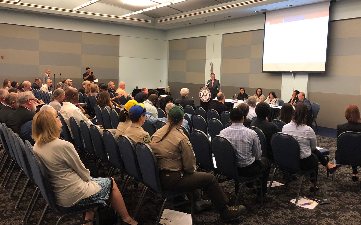From Draft NOtices, October-December 2018
— Edward Hasbrouck  The National Commission on Military, National, and Public Service came to Southern California during September 19-21. It was the only visit west of the Rockies on a national tour of public events, private site visits, and closed-door meetings preparatory to making recommendations to Congress and the President in 2020. The Commission’s recommendations are supposed to address the future of the Selective Service System, draft registration, and a possible special-skills draft or other compulsory service program.
The National Commission on Military, National, and Public Service came to Southern California during September 19-21. It was the only visit west of the Rockies on a national tour of public events, private site visits, and closed-door meetings preparatory to making recommendations to Congress and the President in 2020. The Commission’s recommendations are supposed to address the future of the Selective Service System, draft registration, and a possible special-skills draft or other compulsory service program.
The Commission’s itinerary included a brief public "listening session" at California State University Los Angeles, a visit to the Marine Corps Recruit Depot San Diego, and other undisclosed meetings.
The only public event of the Commission’s three-day SoCal visit was at CSULA. The first hour was devoted to a "service fair" with information tables and recruiters for voluntary service organizations. No counter-recruitment organizations were invited or allowed to participate. The second hour was a panel discussion with four young veterans of the military, the Peace Corps, City Year, and the LA Conservation Corps.
The focus of the panel was on voluntary service. Most of the panelists and participants in the "service fair" hadn't been told that the Commission is tasked by Congress with studying the draft and compulsory service. Several indicated privately that they felt used by the Commission. The agenda and speaker list appeared to have been planned to create a stage-managed and fake appearance of a "consensus" in favor of requiring military or civilian "national service" from all young people.
Despite claims that, "The Commission seeks to learn more about why people serve and why people may choose not to serve,” all of the invited witnesses at all of the Commission's public events throughout the country have been invited as promoters of voluntary service. No one has been invited to speak to the Commission about the reasons people might not serve, or want to serve, in the military.
Some of those reasons were discussed at the Los Angeles hearing in testimony presented by the Santa Barbara Meeting of Friends (Quakers): "The barriers to military service may include serving in undeclared, unconstitutional military actions, loss of freedom, loss of educational opportunities, health, family, personal necessities, Post-traumatic Stress Disorder (PTSD), Moral Injury, Military Sexual Assault, and violation of personal life philosophies."
Only the final half hour of the two-and-a-half hour event was left for comments from the floor. Comment cards on the chairs invited input on issues including "modifications" to the Selective Service System, but didn't mention the specific modifications the Commission has been directed to study, which include: registration of women and "the feasibility . . . of modifying the military selective service process in order to obtain for military . . . service individuals with skills (such as medical, dental, and nursing skills, language skills, cyber skills, and science, technology, engineering, and mathematics (STEM) skills) for which the Nation has a critical need, without regard to age or sex."
About 50 people were in attendance, including members and staff of the Commission. Most of those who had come to speak to the Commission opposed registration and the draft, for women and men.
One of the first members of the public to speak asked the panelists what they thought of expanding draft registration to women. All four panelists said they were against it. But Commission Chairman Joe Heck -- a Brigadier General in the Army Reserve and a Republican former Congressman from Nevada -- doubled down with a follow-up question: Would the panelists support a compulsory service program if there were both military and civilian options? All of the panelists again said no, and several offered eloquent explanations of how coercion is antithetical to the concept of "service," and how community development calls for social change and empowerment from within, not service delivery by outsiders.
The Commission heard testimony from veterans of "alternative service" as conscientious objectors to the draft and of imprisonment for draft resistance, as well as from members of Veterans for Peace, Military Families Speak Out, and others.
Chairman Heck closed the meeting on schedule, even while half a dozen members of the audience still had their hands raised to speak. I had brought printouts of 25,497 signatures on a petition initiated by Julie Mastrine of San Francisco that said, "Don't Force Women to Register for the Draft, Dump the Draft Entirely." But I wasn't called on before the meeting was adjourned, and could only turn in the petitions to be included in the record of written responses to the Commission's inquiry.
The Commission was accepting written comments through September 30th, but has also said that late comments will be accepted. The Commission has been secretive about its research agenda or plans for future public engagement. However, the Commission is required by law to hold publicly-announced formal hearings sometime before announcing its final recommendations in October 2020.
Edward Hasbrouck publishes a website at www.resisters.info with information about the draft, draft registration, and compulsory military service, including records about the National Commission on Military, National, and Public Service obtained in response to Freedom of Information Act requests.
This article is from Draft NOtices, the newsletter of the Committee Opposed to Militarism and the Draft (http://www.comdsd.org/).





